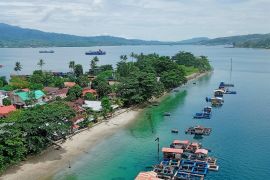Ambon is getting more and more crowded, with 387,475 people in an area of 377 square kilometres, or about two thousand people per square kilometre.
Therefore, the space in the city is getting increasingly limited and it is unable to accommodate a wide range of activities.
Hence, people are forced to build houses along river banks and on hillsides, which are prone to flash floods and landslides.
Consequently, many people in Ambon have been killed in landslides and flash floods in the past few years, and hundreds of houses have been either swept away by floods or buried in mud.
Besides, traffic jams along the main roads in the city, better known as "Ambon Manise" (Nice Ambon), sometimes make motorists frustrated, causing them to engage in road rage.
Road rage in Ambon, at times, leads to altercations, assaults, and collisions, which result in injuries and even deaths, thought of as an extreme case of aggressive driving.
Therefore, the Maluku provincial government is looking into an alternative plan to relocate the provincial capital of Ambon to Makariki, Amahai on Seram Island in Central Maluku District.
Seram is Maluku`s largest island, where the landscape is dominated by mountains and tropical forests, and the Manusela National Park is home to a number of animals and plants.
Therefore, Head of Central Maluku District Abdullah Tuasikal said the relocation of provincial capital to Makariki is necessary to reduce the number of people in Ambon.
Tuasikal`s statement underlined the Maluku provincial administration`s plan to relocate the provincial capital from Ambon to Makariki.
"Everything is ready and it is only a matter of time before the plan is realised," noted Tuasikal.
The plan to relocate the provincial capital to Makariki is being drawn up because the relocation is believed to reduce the population density of Ambon in the midst of an increasingly limited space.
According to Maluku Regional Development Planning Board (Bapeda) Chief Antonius Sihaloho, the provincial government will soon submit the proposal on the relocation plan to the Ministry of Home Affairs.
"The relocation of provincial capital must be preceded by a government regulation that should be issued by the Ministry of Home Affairs," said Sihaloho, as quoted by Kompas.
During his visit to Ambon in March 2013, Transportation Minister EE Mangindaan mentioned that he supports the plan to relocate Maluku provincial capital from Ambon to Makariki.
"I agree and support the idea of shifting Maluku provincial capital to Makariki because Ambon is no longer able to support various development activities," said Mangidaan.
According to him, Ambon is becoming smaller in size because of development activities, and therefore, it is reasonable to move the capital to Seram Island.
"I have seen rapid development; so, there is no more empty land here," added Mangindaan.
He mentioned that the shift of the provincial capital to Makariki should be preceded by a feasibility study, although it has been supported by road infrastructure and other supporting facilities.
"If the design of development is completed, we can map the location of houses, government offices, the airport, and the seaport," noted the minister.
He said the plan to remove the capital should be supported by all parties in the province because Ambon does not have the proper infrastructure to be a provincial capital.
"If the capital is successfully moved to Makariki, it will be the first in Indonesia, and thus, an accurate feasibility study should be conducted for it to be an example for other provinces," he said.
Ironically, Mayor of Ambon Richard Louhenapessy noted that the plan to relocate Ambon to Makariki is neither necessary nor a priority since it will require a huge amount of funding.
He pointed out that the poverty rate in Maluku is still high, and therefore, the welfare of the residents should take precedence over the plans for relocation.
"The provincial government is entitled to its opinion on relocating the provincial capital, but in my opinion, the relocation funds would be better spent on the welfare of locals," said the mayor on Tuesday.
Louhenapessy expressed hope that the relocation funds to move Ambon to Makariki on Seram Island would be used to develop the infrastructure in each of the province`s districts instead.
"The plan to relocate the provincial capital depends on the vision and considerations of the local government, but I believe it is better to use these funds to develop the infrastructure in every district," he said.
The mayor noted that developing economic, social, and transportation infrastructure in the districts of Southwest Maluku, West-Southeast Maluku, Buru, and South Buru could attract urban populations to these areas.
"Therefore, there is no urgency in relocating the provincial capital. Perhaps it can be done in the next 10 to 20 years when the situation and conditions change. Now is not the right time for such a move," added the mayor.
According to Chairman of Maluku Provincial Legislative Assembly`s Commission-A Richard Rahakbauw, the relocation will take around 25 to 30 years because of various considerations.
"It is not possible to relocate the provincial city of Ambon to Makariki in ten years because the development of infrastructure and its supporting facilities in the new city will take a lot of time," said Rahakbauw.
He added that the provincial administration should coordinate with Ambon city administration for an agreement concerning the relocation.
"There should be an agreement from Ambon city administration to prevent political instability in future," asserted Rahakbauw.
He added that the Provincial Legislative Assembly`s Commission A is overseeing the political space and the government has urged the provincial government to establish economic growth centres in Makariki.
Meanwhile, Director of Nice Voice Maluku Institute Agus Siahaya said the relocation of the provincial capital is inevitable.
"The relocation of provincial capital is a step forward and the best possible solution to the problem of overcrowding in Ambon city," added Agus Siahaya.
According to him, the relocation of the provincial capital is inevitable because the carrying capacity of Ambon city is no longer proportional to the ever-increasing population growth and limited employment.
"In the years to come, the population increase in Ambon city cannot be controlled any longer, and with the present condition, I believe the relocation of provincial capital is important and should be carried out immediately," he continued.
He believes that the relocation will have a positive impact on the equitable development process in "The Province of One Thousand Islands."
Siahaya noted that given its extensive area, Makariki in Amahai is ideal for replacing Ambon as the capital of Maluku province, while Ambon can be transformed into an economic centre and an education hub in the province.
The relocation of Maluku provincial capital to Seram Island was first voiced by Indonesia's founding father Soekarno during the declaration of Masohi as the capital of Central Maluku district in 1957. (*)
Reporter: Otniel Tamindael
Editor: Otniel Tamindael
Copyright © ANTARA 2013











